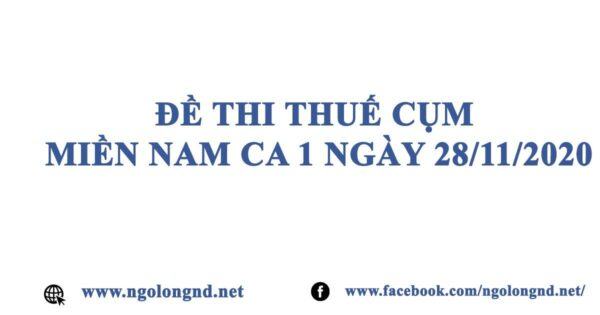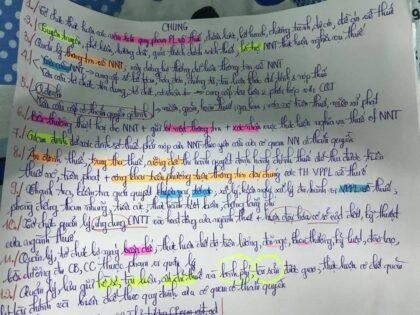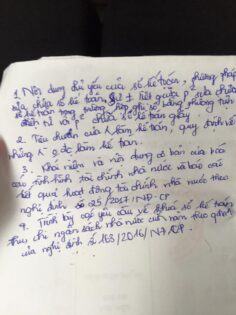Tài liệu Môn kiến thức chung + Tiếng Anh ôn thi công chức hành chính 2022. Ngolongnd.net tổng hợp các tài liệu ôn thi công chức Hà Nội vòng 1 có đáp án gồm kiến thức chung và tiếng anh b1. Bộ tài liệu ôn thi công chức Hà Nội được soạn thảo dựa trên Quyết định số 9566/QĐ-HĐTT ngày 25/8/2022 về nội dung ôn tập các phần thi tại Vòng 1 kỳ thi tuyển công chức hành chính năm 2022 của Hội đồng thi tuyển TP Hà Nội. Mời các bạn tham khảo.

Nội dung chính:
Môn kiến thức chung ôn thi công chức hành chính 2022
1. Hiến pháp Việt Nam năm 2013.
2. Luật Tồ chức chính quyền địa phương số 77/2015/QH13.
Các Chương: I, II, III.
3. Luật số 47/2019/QH14 về sửa đổi, bổ sung một số điều của Luật Tô chức Chính phù số 76/2015/QH13 và Luật Tô chức chính quyền địa phương số 77/2015/QH13.
4. Luật Cán bộ, công chức số 22/2008/QH12.
5. Luật số 52/2019/ỌH14 về sửa đổi, bổ sung một số điều của Luật Cán bộ, công chức số 22/2008/QH12 và Luật Viên chức số 58/2010/QH12.
6. Luật Ban hành văn bán quy phạm pháp luật số 80/2015/ỌH13.
Các Chương: I, II, VIII, IX, X, XIII.
7. Nghị định số 34/2016/NĐ-CP ngày 14/05/2016 cùa Chính phú quy dinh chi tiết một số điều và biện pháp thi hành Luật Ban hành văn bân quy phạm pháp luật.
Các Chương I, II, IV, V.
8. Nghị định số 154/2020/NĐ-CP ngày 31/12/2020 sứa đổi. bổ sung một số điều cùa Nghị định số 34 ngày 14/05/2016 cúa Chinh phù quy dịnh chi tiết một số diều và biện pháp thi hành Luật Ban hành văn bân quy phạm pháp luật.
Các Điều: 1,2.
9. Luật phòng chống tham nhũng số 36/2018/ỌI114.
Các Chương I,II, III, IX, X.
10. Nghị dinh số 90/2020/NĐ-CP ngày 13/8/2020 cũa Chính phù về đánh giá, xốp loại chất lượng cán bộ. công chức, viên chức.
11. Nghị định số 112/2020/NĐ-CP ngày 18/9/2020 cũa Chinh phú quy định về về xử lý kỳ luật cán bộ, công chức, viên chức.
12. Nghị định số 30/2020/NĐ-CP ngày 05/03/2020 cùa Chính phu vẻ công tác văn thư.
13. Nghị định số 138/2020/NĐ-CP ngày 27/11/2020 cùa Chính phú quy định về tuyến dụng, sử dụng và quan lý công chức.
14. Nghị quyết số 76/NỌ-CP ngày 15/7/2021 cùa Chính phủ ban hành Chương trình tồng thể cài cách hành chinh nhà nước giai doạn 2021 – 2030./.
Môn ngoại ngữ – Tiếng anh
I. Phương thức làm bài:
– Thí sinh được kiêm tra kỹ năng sư dựng ngôn ngữ, kỹ năng đọc, viết môn Tiếng Anh, dạng bài trắc nghiệm khách quan trên máy vi tính, mỗi câu hởi bao gồm 04 phương án trả lời và chỉ có duy nhất một phương án đúng
– Nội dung: Ngoại ngừ dùng để giao tiếp hàng ngày
– Giáo trình tham khảo: Lite lines, New Headway, New English File (Pre- Intermediate)
II. Nội dung ôn tập và các ví dụ:
1. Category:
1.1. Verbs and verb form ‘ỉ (Động từ và dạng của động từ)
– .1.1 Verbs (Động từ):
– to be, to have, to do, to make, to answer, to bring, to hope, to get, to discuss, to change, to dress, to eat, to follow…
– phrasal verbs: call back, get back, get off, get on, grow up, pick up, put on, stand up, take off, try on, turn on, tum off…
Eg:
– Students………. a lot of homevvork in the evening. (do, answer, teach, leam)
– I often……. the dishes alìer dinner. (wash, clean, make, brush)
– She……. English very weli. (speaks, says, teP.s, anwers)
– He…….. the television to watch a Cóotball match. (tums on, turns off, gets on, gets off)
– My mother…… on a far a in the eountryside. (picked up, stood up, grew up, got up)
– 1.2 Modal verbs (Động từ khuyết thiếu)*
– can (ability now, request;
– could (abiỉity in the past, possibilỉty; polìte reqĩiest suggestions)
– should, shouldn’t (advice)
– have to (must do smt)
– may/might (weak possibility at present or in the/uture)
– would (wishes, preferenccs)
Eg:
– You should ……… the ỉ ghts befóre going out. (tum off, to turn off, turning off,
tumed off)
– We have to………. computers to do our dai ly working. (to use, using, use, used)
– Can you………. this evening. please? (to cook, cook, cooked, cooking)
– My mother…… speak English when she was young, but she can’t now. (can, could, should, has to)
– You have to …earlier in the morning to go to vvork on time.(get up, to get up, got up, getting up)
– Nowadays, young people can ……… English very fluently. (speak, to speak, speaks,
speaking)
– I……… like some orangc ju’>e, please. (may, might, coidd, would)
– She…….. go to the zoo or the park. She isn’t surc. (may, has to, would, should)
1.1.3 Forms of verb (Các dạng của động từ):
– Imperatives
– Iníìnitives (with and vvithout to) after verbs and adjectives
– Gerunds (-ing íồrm) after verbs and prepositions
Eg:
– in class, please. (Don“t taỉk, Not to talk, Nct talking, Not talk)
– in please, we h.ìve just come. (Come, To come, Corning, Came)
– cigarettes is bad lồr your nealth. (Smoke, Smoking, Smoked, To smoke)
– Children like………… piclure books. (read, reading, to read, to reading)
– English people are interiSted in ………….. tbotball matches at vveekends. (watch, to
watch, watching, watched)
– She wants ……….. in the countryside because it’s peacefuL (live, living, to live,
lived)
1.2. Nouns (Danh từ)
– Singular and plural (regular and irregular forms)
– Countable and uncountable nouns vvith some and any
– Compound noiins
– Possesive case with ‘s & ?’
Eg:
– How many……….. are th :-re in yoưr íamily? (child, chi1 Ten, childs, childrens)
– This is…………. house and. that is ìiers. (Alice’s, Alice, of Alice, of Alice’s)
– 1 saw some………. (buttcríly, butterílys, butterílies, butterílyes) in the garden.
– Do you have ……… (some, atiy, many, a lot) money? Can I borrow (any,
some, much, many)?
– I always wait for a bus at the ………… (bus stop, post office, police station, traĩíic
light)
– How much……… (money, moneys, moneyes, moneies) do you need?
1.3. Adjectives (Tính từ):
– • Colors, size, shape, qualiíy, nationality
– Cardinal and ordinal numoers
– Possessive: my, your. his, her, etc
– Quantitative: some, anv, riany, much, a fevj, a ỉot of, every.
– -ing/ -ed
– Comparative, equality and superlative (regular and irregular)
Eg:
– Tom is from England. He is…………….. (Englaud,.. English, Germany, German).
– 1 would like to buy this ………. book. (interesting, interested, boring, bored)
– My room is………… than yours. (biger, biggeỉ, more big, more bigger)
– Among my friends, Lan s the………………. of.. ail. (most interesting, more interesting,
so interesting as, as interermg as)
– His task is as …………. as mine. (difficult, rnore difficult, the most difficult, most
diííìcult)
– Billy is the……… student in his class. (good, gooder, best, better)
1.4. Adverbs (Trạng từ):
– Regular and irregular íồrms
– Manner (quickly, carefulỉỵ, etc.)
– Erequency (often, never, twice a day, weekỉy, ctc.)
– DeTinite time (now, yestei-day, aỉready, just, yet, ”tc.)
– Degree (yvith adjectives/a.lverbs: very, too,.so, auite, so much, a lot, etc.)
– Place (here, there, etc.)
– Sequencing (fìrst, then, cỵỉer that, ?:c.)
– Certainty (maybe, perhaps)
– Attitude, viewpoint (actu ‘ỉly, unfortunateỉy, of ‘course, etc.)
Eg:
– He can run very………….. No one can catch him. (tầst, íầstly, slow, slowỉy)
– Linh does her work very………………. She is a good wcrker. (careful, careíìilly, bad,
badly)
– She plays the guitar raner ……… (good, weh) ard she can dance (gracetully,
gracefuỉ, grace)
– She………… goes to school early. She is never late for school. (alvvays, sometimes,
oíìen, never)
– They haven’t done their homework…………. (already, just, never, yet)
– I don’t like living in Engíand. The weather is………….. cold for me. (too, so much, a
lot, enough)
– I waited for her for IWO hours………….. , she didn’t come. (Uníồrtunately, Maybe,
Perhaps, Actually)
1.5. Pronouns (Đại từ):
– Personal (subject, obịect)
– Impersonal: ỉt, there
– Demonstrative: ĩhis, thai, these, those
– Indeíìnite: somethỉng, ev^ybidy, some, any, etc.
Eg:
– That man is my boss……….. manages the office well. (He, His, She, Her)
– computers are lĩhide in Japan (This, These, They, There).
– wants to be happy. (Everybody, Something, Nobody, Anything)
1.6. Articles (Mạo từ/Quán tù):
– ứ/an + countable nouns
– the + countable/ uncountable nouns
Eg:
– 1 have…….. aunt in An erica. (a, the, an, 0)
– They live in….. (a, an, íhe, 0) house in the country……………. house is large. (A, An,
The, 0)
– His wife plays…………….. piano beautifully. (a, that, the, this)
– Nowadays, we use………….. computers to do our work. (a, an, the, 0)
1.7. Prepositions (Giới tù):
– Location: to, on, insỉde, next ĨO, at (home), etc.
– Time: at, on, ỉn, etc.
– Direction: to, into, out of, from, etc.
– Instrument: by, with
– Prepositions following:
* adjectives: afraidof, ừưerestedin…
* verbs: ỉaugh at, askfor,etc.
Eg:
– We alvvays go……………… (on, in, at, of) holiday…………… (on, at, in, of) summer.
– Do you have to go…………… v/ork at weekends? (at, to, in, on)
– They arrived here…………… (on, at, in, of) August lst.
– 1’11 see you there………… (cn, at, in, 0) tomorrow.
– She went to work………….. (by, with, in, of) car.
– “How did you travel to Rance?” 4 We wcnt………….. plane.” (on, in, by, of)
– My children go to schoo:……………. foot everyday. (on, by, in, of)
– My son doesn’t like aski; g his Mun………….. pocket money. (to, at, for, of)
– We’re leaving……….. 3 < -‘clock this Sunday. (on, in, at. of)
– Don’t be late…………. the meeting. (to, in, for, of)
– Ít takes him four hours 10 go …………… Hanoi ………… Phu Tho. (from/to, from/from,
from/in, to/in)
1.8. Connectors (Tù nối):
– and, but, although
– when, while, until, before5 after, as soon as
– because, since, if, howev/r, so, a!so
Eg:
– He went to school late……. he missed the bus. (when, but, because, so)
– The children ……….. games while their parents …………….. together. (were playing/
were chatting, played/ chal.ed, play/chat, have played/have chatted)
– Linda has only some money in her pocket, ……………. she has much money in the
bank. (and, although, but)
1.9. Interrogatives (Tù đế hỏi):
– What, What (+ noun)
– Where, When
– Who, Whose, Which
– How; How much; How n.any; How often; How long.
– Why
Eg:
– from Hanoi to Da N’ing? (How far, How íầr it is, How far is it, How far is)
– “………. do you work?’* “ín Hanoi”. (What, How, Where, When)
– “……… did you do that?” “Because I needed something to eat.” (What, Why, Who,
When)
– “……… is this watch?” “It’s SI00.” (How many, What price, How much, Which
price)
– “……… do you go out for dinner?” “We eat out b.vice a month.” (How much, How
long, How often, How)
– “……… is she living wbh?” “Her family: parents, an oỉder sister and a brother.”
(Which, Who, Where, Wh:’)
1.10. Quantiíiers (Từ chi 7ố lượng)
– each, all, both, no
– all of, some of, both of, n .any of, any of, each of, (a number) of
E.g.:
– 1 have two sisters………… them are íarmers. (Both of, Some of, Each of, All of)
– I can’t buy that shirt. ì have………… money. (some, all, no, each)
2. Tenses (Các thì/thòi):
– Present simple: States, hahits, truths
– Present continuous: actions that are happening at present
– Present períect simple:
* recent past with just
* indeíĩnite past with never, ever (experience with ever, never)
* uníínished past with f’ r, since
– Past simple: past events/ lỉnỉshed actions in the past
– Past continuous: actions that were happening at a specific moment in the past
– Future with going to: future plans
– Future with will, shaỉl
Eg:
– The Earth……….. round ‘he Sun. (goes, 1S going, went, was going)
– We………. officials of Elanoi People’s Committee. (are being, are, is being, is)
– She usually……………… <0.. work iate. (go, goes, went, was going)
– At the moment, alỉ of us ……………… for.. the exam on 27lh of October. (prepare, are
preparing, prepared, were preparing).
– We……………. the exam m 4lh of Aưgust. (take, are taking, will take, have taken)
– “Where………. the Head?” “She………….. now in the Hall, making a speech.” (is/is,
is/is being, was/was, was being/ was)
– I ……. my work. Tm on t.ie way home. (havejust íinished, just íìnish, just íĩnished,
am just íìnishing)
– you ever…………………. to England? (Did/be, Were/ 0, Have/been, Will/be)
– He …………. in this company for ten years. (worked, has worked, works, have
worked)
– They have been there ;>ince ………………….. (last Saturday, at 6 o’clock, a week,
tomorrow)
– ………………… at home >esterday? (Do you stay, Did you stay, Have you stayed,
Will you stay)
– I ……. a new TV two days ago. ít costs 7 million. (buy, bought, have bought, will
buy)
– Thomas………….. busy List Saturday. (is, has been, was, will be)
– you at school yesterday moming? (Were, Are, Do, Did)
– At this time last weeke.:ds, she ………………. her holiday in a luxury resort in Nha
Trang, (spent, was spending, has spent, is spending)
– We ………… the museum this akemoon. Will you go with us? We have enough
tickets for us. (visit, are go ng to visit, wiII visit, have visited)
– The Government ………….. a new birdge across this river next year. (build, shall
build, is going to bui ki, ha’ e built)
– How oíìten …………. yotir grandparents? (did you visit, will you visit, do you visit,
are you visiting)
– How long …………… in this City? (does she live, is she living, has she lived, shall
she live)
– What…………….. last Sunday? (did you do, do you do, have you done, wil 1 you do)
– ỉn the year 2050, people ………….. under the sea. (live, will live, are going to live,
have lived)
– ………… Paul? (Are yoi. going to marry, Shail you marry, Do you marry, Are you
marrying)
3. Conditional sentences (Câu điều kiện):
– Type 1: lf + present simp e, íùture simple
– Type 2: If + were/ V-ed, vould/wouldn‘t… + V
Eg:
– If it rains a lot, trees in our garden………. (wi 11 die, dies, is going to die, would die)
– lf it…………. fine tomorrovv, we………….. camping. (is/will go, is/go, will be/go, will
be/will go)
– You can get high evaluation trom the Director Soard if you……………. your best. (try,
tried, are trying, were tryin .0
– I wouldn’t do that if I…………….. you… (am, was, were, ate)
– lf we were here now, V. 3 ……….. tennis.. with you (could play, play, played, will play)
– Where …………… if… yoi; move to Ho Chi Minh City next month? (did you work,
would you work, wil 1 you ?/ork, could you work)
– What …………….. if. you had much power? (will you do, can you do, would you do,
did you do)
4. Reỉative cỉauses (Mệnh đề quan hệ):
– deíìning yvhich, whỡ’ thú1 in lelative clauses
– non-deíìning with which vvho in relative clauses
Eg:
– We are talking about tỊ.e man …………… set tĩrst foot on the Moon. (which; who;
which; who)
– 1 love the manager……….. you are taìking about. (which; which; that; that)
– This is my mother,……….. lived in the countryside all her life. (which, who, that, 0)
5. Verb Patterns:
– Gerunds after prepositỉons
‘ Verbs followed by the gerund
– Verbs followed by an inịhỉitive
Eg:
– 1 am bored with…………… at home all day. (stay, staying, to stay, to staying)
– 1 enjoy……….. at weekends. (to íìsh, íishing, tìsh, to íisking)
– They decided………… married. (get, got, getting, to get)
– Tony went to the post off.ce………… a bi 11. (pay, paying, paid, to pay)
– She was working while I passed by. She stopped …………… and we talked about her
last holiday. (working, to v/ork, work)
– She was working while ỉ passed by. 1 asked her about the way to London. She
stopped………….. me the way. (shovving, to show, show)
– Remember ……………. the.. lights after work. (tum off tuming off, to tum off, to
turning off)
6. Passive voice (Câu bị độ íig);
– Affirmative Passive of: Pn sent Simple, Past SlmpỊe
Eg:
– Flowers………. in the ec’ rly momlúg. (cut cuts, are cut, is cut)
– My car …………… yesterc.ay in a good garage (was repaired, repaired, is repaired,
repairs)
– Whére……. your watch…….. ? (is….made, does….. make, do….. make, are ….made)
– My Computer……………. in America. (was make, made, makes, was made)
– The children……………. to schooỉ every moming by a careíul driver. (are taken, take,
took, is taken)
– Until 9 last night, the work……………… very well. (1S íinished, was íinished, íìnishes,
Tinished)
7. Question tags (Câu hỏ; đuôi):
– Limited range of questioĩ’ tags
E.g:
– It is interesting,………….. it? (is, isn’t, was, wasn’t)
– They go to school,…………… they? (do, don’t, did, didn’t)
8. Reading topics:
Cuộc sống, công việc hàng ngày, Các hoạt động giái trí, Thủ đô Hà Nội, Giao thông, Môi tnrờng, Các thành tựu khoa học.
Eg:
A morning in the life of Paula Radcliffe – Marathon Runner 8.30 a.m.
Sometimes, my daughter I da wakes me and my husband, Gary, up, or, more otìen, we wake her up. Aiìer I get UẸ, 1 aìways check my pulse. It’s usually 38-40 beats per minute. lf it is too high, 1 mst for the day. lt’s so importani to listen to my body. ỉ have a drink and a snack while g;ving Isỉa her breakíast.
9.30 a.m.
We take Isla to nursery and then 1 start my training. I run, and Gary rides his bike next to me and gives me drinks. Lour times a weeK, I have a cold bath or go for a swim in a lake after training.
12.30 p.m.
I pick up Isla from nursery and we go home and I eat a big lunch of cereal and fruit. Then I have rice and salmon, or toast and peanut butter. I :ry to eat as soon as possible after training. After lunch, usually at 2.30 p.m. í play with my daughter.
Questions:
– What is the passage abot ?/ What is the main idea of the passage?
+ Paula’s morning
+ Paula’s life
+ Paula’s íamily
+ Paula’s work
– What does Paula Radcliffe have for breakíasi?
+ a drink and a snack
4- cereal and fruit
5- rice and salmon
+ toast and peanut butter
1- Why does she always cheek her pulse after getting up?
4- – Listening to her body is ‘inportant.
+ She wants to rest for a day.
+ She checks it to have a b g breakíast.
5- She likes it to be high.
– How often does she have a co!d bath or go for a swim after training?
4- every week
5- four times a week
4- every day
4- four times a day
– What time does she pick ’ip her daughter?
4- 8.30 a.m.
+ 9.30 a.m.
4- 12.30 p.m.
4- 2.00 p.m.
– Which is TRUE about Paula Radcliffe?
4- Isla, her daughter, wakes her and husband up everymoming.
+ She takes Isla to nursery Ít 9.30 a.m.
+ Whiie she runs, Gary ridcs his bike next to hcr and gives her drinks.
+ She eats a big lunch of cereal and íruit.
9. Sentence- structrures íbr revvríting:
– What 4- be 4- the price of 4- noưn?
– How much 4- be 4- ,ioun?/ How much 4- do/does 4- noun cost?
– show the way to, h ,w to get to
– have 4- noun / The ■ + be 4- noun
– s + be 4- adj + pre. r V.
– s + V 4- adverb.
– spend time 4- V-ing
– It takes/took smb -I- tiiĩie + to-V
– remember to-V, d. >n’t tồrgel to-V
– like to-V/ V-ing
– be fond of/ keen on + V-ing
– To- V/ gerund + be + adj.
– It’s + adj + to-V.
– too + adj/adv + to- /
– so + adj/adv + thai + negative/ possitive
– adị/adv 4- enough + to-V
– Combine sentences by Lising relatives: who, whom, which…
– Conditional sentences.
– Present situation -> Conditional sentence Type 2.
– Active -> Passive
– Comparisons.
– ShalL…? (as offer. I
– be sure + clause
– Let’s … (as sugge lions)
– What a/an + noun phrase (+ clause)
Eg:
1. I cut these flowers yesterday morning.
-ỳ These flowers………………………………….
2. Somebody cleans the ro om everyday.
->The room…………………………………..
3. They built this villa 206 vears ago.
->This villa…………………………………..
4. She took him to the cincina on tirne.
->He………………………………….
5. That skirt is too small fo’ my daughter to wear.
->That skirt is so………………………………….
6. Why don’t you stay in bed foi a few days?
“> If I were you,………………………………….
7. lt’s warm enough for chiỉdren to vvalk outside.
-> It’s so warm……………………………………
8. Barbara is the tallest gir in her ciass.
-> Nobody in Barbara’s c’ 1SS…………………………………..
9. Linh is 170 cm tall. Her ìusband is 170 cm, too.
Linh is as………………………………….
10. This bag costs 2 millio’1 and that one is 3 million.
-> That bag is more……………………………………
11. No country in the world is larger than Rưssia.
-> Russia is the…………………………………..
12. The man is my boss. You niet him at the cinema yesterday.
-ỳ The man that………….. ……….. …………
13. The woman is my aun She works as a plastic surgeon.
-> The woman who……………………………………
14. The school is very old. He is studying in íhat school.
-> The school which………………………………….
15. Can you tell me the way to the nearest station?
-> Can you tell me how………………………………….. ?
16. Remember to do all your homexvork beíồre class.
-ỳ Don’t íồrget…………………………………….
17. What is the price of thi.; Computer?
-> How much is…………………………… ?/ How rnuch does………………………. ?
18. Our office has íìve priĩiỉers.
-> There are……………………………………
19. He is a good íootbali p ayer.
-> He plays……………………………………
20. I don’t think you shoui’1 do that.
-> If I were you,………………………………….
21. They will spend tvventy months building this bridge.
-ỳ It will take………………………………….
22. Young people like listí ling ĨO Korcan music.
-ỳ Young people are interested…………………………………..
23. Taking exercises everyday is good for our heaìth.
“> It’s good……………………………………
24. We are in the room no .-. We shoưldnT use mobile phones.
-> If we weren’t in the room now,……………………………………
25. They don’t have much money. 1 hey live in a small house.
-> If they had much/more money, they would live …………………………….. /they
wouldn’t live…………………………………..










